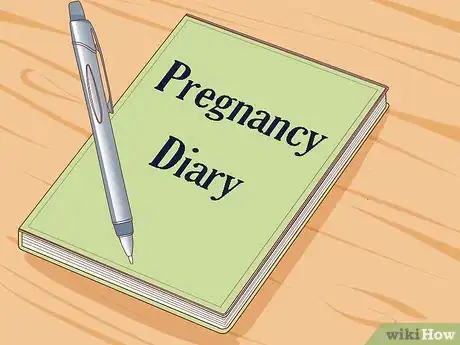This article was co-authored by Klare Heston, LCSW. Klare Heston is a Licensed Independent Clinical Social Worker based in Cleveland, Ohio. With experience in academic counseling and clinical supervision, Klare received her Master of Social Work from the Virginia Commonwealth University in 1983. She also holds a 2-Year Post-Graduate Certificate from the Gestalt Institute of Cleveland, as well as certification in Family Therapy, Supervision, Mediation, and Trauma Recovery and Treatment (EMDR).
There are 18 references cited in this article, which can be found at the bottom of the page.
This article has been viewed 40,732 times.
Whether your pregnancy is a surprise or a planned event, you will feel a variety of extreme emotions while pregnant. Negative feelings can stem from not feeling ready or not knowing what to expect, among other things. However, it is possible to take back some control over your emotions by purposefully bonding with your baby in the womb. You can also boost your mindset by treating your body well. Reaching out to other people will create a support network that can lift you up and support you in your darker moments. If you are feeling seriously depressed or anxious, you may have prenatal depression: see your doctor, especially if you have a history of depression, anxiety, or a previous poor response to birth control pills.[1]
Steps
Putting Yourself in a Positive Mindset
-
1Bond with your baby. It is possible to forge a deep connection with your baby before they are even born. Gently pat or rub your belly, making soothing sounds for your baby. Listen to classical music and watch to see if your belly moves in response. Study your ultrasound photos and imagine what your baby will look like. Try to feel connected instead of isolated from your growing baby.
- Talk or sing to your baby as you go about your day. Describe to them what you are seeing and your thoughts and feelings. You might say, “I just went to the store and looked at some toys to buy for you. I wonder what you’ll like. I can't wait to meet you!” And, If you feel lonely, this will provide some comfort for both of you.
-
2Schedule regular pick-me-up moments. Plan pampering activities that you enjoyed prior to being pregnant. Go see a movie, hit the mall, or get a prenatal massage. Make yourself the focus for a few hours at a time. This will also help to break the monotony that comes from a stream of never-ending baby-related medical appointments.
- If the idea of making yet another appointment is just too much, find activities that do not require pre-planning, such as wandering the bookstore.
Advertisement -
3Keep a pregnancy diary. Write down your everyday thoughts and emotions in a journal for your eyes only. You may keep another journal that discusses the baby’s movements, etc., but this diary is intended to be an honest outlet for all of your feelings, be they positive or negative.
- Try to keep balance in your diary by keeping a one-to-one ratio of positive and negative observations. For example, if you write about your sore feet, balance that out with a line or two about how you’ve discovered that your hair is fuller than ever.
- Don't feel bad about your negative feelings, as they are typical. Some women enjoy pregnancy more than others, and there's nothing wrong with feeling differently.
-
4Educate yourself about having and caring for a baby. Look online for pregnancy blogs, buy or borrow pregnancy and baby books, subscribe to related magazines, etc. You’ve been given a nine-month window to gather as much information as you can about this major change in your life. Knowledge is power and it will combat the fear of the unknown, which can be a real problem in pregnancy.[2]
- Doing your research will also show that you do not have to, and will not be, the exact same as your parents. No matter how you feel about how you were raised, you are experiencing pregnancy in a way that is unique solely to you. You will also parent in a way that is unique to you, and that's okay.
-
5Identify what factors you can and cannot control. When faced with negative feelings, ask yourself if your feelings are focused on something that is actually within your control. If it is within your control, then try to figure out how to address the main problem. If it is not within your control, then you have to push it to the back of your mind and leave it alone.
- This is an especially important process for women who are pregnant with complicated medical histories, such as suffering from miscarriages. Fear for the ultimate safety of your baby can be crippling if you do not address it. Focus on what you can do to improve your baby’s health, such as taking prenatal vitamins and following your doctor's advice.[3]
- Feelings of fear and anxiety when pregnant are not always a bad thing either. In fact, they help to activate a woman’s protective impulse toward her baby, leading to a good standard of care in the long term.[4]
Appreciating and Treating Your Body Well
-
1Go outside and get some fresh air. Find a park bench and sit on it for a while. Lay a blanket on the grass and take a quick, sunny nap. Lounge on a tree-shaded chair. You may feel compelled to stay inside due to your nesting instinct, etc., but push yourself to head outdoors for at least 30 minutes every day.
-
2Eat a balanced and pregnancy-appropriate diet. Make sure that you consume consistent meals and healthy snacks throughout the day. For example, eat at least four servings of veggies every day and between two to four servings of fruit as well. Try to include a protein, dairy, and grain product in every major meal as well. Limit your consumption of processed foods and sugars. Eating well will make you more able to cope with the physical and emotional challenges you’ll face during pregnancy.[5]
- Staying hydrated by drinking plenty of water will also help to alleviate pregnancy headaches, which will provide a boost to your spirits as well.
- If you struggle to eat properly while pregnant, you may want to see a nutritionist. They can provide you with easy-to-follow meal plans and also give you positive support during and after your pregnancy.
-
3Exercise and stay active. Do at least three 30-minute sessions of some sort of exercise each week. This could mean walking or even taking a prenatal yoga class. The point is not to prove that you can run a marathon, this is about you recognizing the strength and beauty of your body. Do activities that make you feel exhilarated, not exhausted.[6]
- Watching how well your body continues to respond to exercise, even late in pregnancy, will also help to diminish some of the concerns that you might have about the birth process itself. Trusting your body is something that takes time to develop.
- Make sure to consult with your doctor regarding your exercise patterns. You may need to avoid certain activities, such as horseback riding, or tailor other activities to accommodate the changing health needs of you and your baby.
-
4Get enough rest. Aim to get at least eight solid hours of uninterrupted sleep a night. And, try to fit in at least one 30-minute nap each day, add additional and longer naps if you can. Getting enough rest is important because lack of sleep can increase negative emotions and aggravate other physical symptoms that you may be experiencing, such as nausea.
- Exhaustion is the most common complaint made by women in the first trimester of pregnancy. Just know that your quality of sleep should improve as you head out of this initial period. The second trimester is generally a much more tranquil period.[7]
-
5Take quick action to resolve any pain that you are experiencing. Pregnancy can be an uncomfortable time for many women, however, you should not suffer through pain needlessly. Listen to your body and seek out medical help if you feel as if something is “just not right.” Be persistent until you have the answers that you require.
- Don’t be ashamed or feel weak about talking with someone about the pain that you are experiencing. Pain in pregnancy is often a sign of serious medical concerns. For example, it is normal to have some abdomen twinges during the first trimester, however, serious cramping could indicate a host of life-threatening conditions, including an ectopic pregnancy.[8]
- Be very careful about the pain medications that you use during pregnancy. Before you take anything, call your doctor or your doctor’s nurse to get the okay.
-
6Dress to flatter your changing body. Shop at maternity stores for the latest fashions, or browse re-sale shops for similar clothes at a substantial discount. Pick clothes out that flatter your changing shape and do not be afraid to wear clothes that are fitted. Spending a bit of time on your appearance will boost your self-confidence, leading to more positive emotions.
- Don’t believe the stereotype that maternity clothes must be baggy and unflattering. Now you can purchase items that will make you look great at every stage of your pregnancy. You can still buy the type of clothes that you enjoy with a few modifications for comfort.
Building A Support Network
-
1Join a support group. Your doctor may be able to suggest groups that meet via the hospital or you can search online for gatherings in your area. Look for groups composed of pregnant women who may be experiencing similar emotions as you. If you don’t feel comfortable meeting in person, you can always find online support and chat groups as well.[9]
- When you attend, listen actively but also jump in with questions and share your thoughts. Talking with others will show that your struggles with negative emotions are important, but not necessarily unusual.
- To find support groups online, you might search for "prenatal support" "pregnancy support group" or "prenatal depression discussion (or support) group." The PANDAS Foundation of the UK offers both online and telephone support for pregnant women and new mothers. The BabyCenter community pages are another good option as well.
- Prenatal depression is also called "antenatal" depression, so look for resources using that term as well.
- Check out the Antenatal Depression Forum at Netmums.[10]
-
2Enroll in pregnancy and childbirth classes. Your hospital or another health agency in your area will likely offer a wide variety of classes designed for new parents. These classes will teach you practical matters, such as how to change a diaper, which will make you feel even more competent moving forward. They also give you the chance to spend time with a group of people who are working through the stages of pregnancy.[11]
-
3Strengthen your bond with your partner. If you have a partner, spend time doing something that you both enjoy, such as going to a movie. This may help to counter any loneliness that you might feel. It also reinforces the fact that you should approach pregnancy as a team.[12]
- Ask your partner for help and tell them that you appreciate what they do. They will likely reciprocate in kind, leading to positive, open communication patterns. You might say, “Thank you for hanging those pictures in the nursery, they look really great.”
- If you do not have a partner, you can find a great support network in other single mothers. Reach out to them via online networks and use your pregnancy to develop strong friendships.
Recognizing and Treating Prenatal Depression
-
1Look for the symptoms of prenatal depression. If your negative feelings intensify and begin to alter your everyday choices and activities, you may have prenatal depression. Watch for drastic changes to your eating patterns (beyond what you might consider ‘standard’ pregnancy cravings or nausea). Poor memory retention, feelings of worthlessness, continual crying, lack of interest in previous hobbies, pulling away from family/friends, and feelings of deep sadness or anxiety are all possible signs of depression during pregnancy.[13]
- If you have prenatal depression, know that you are not alone. Between 13-30% of pregnant women and new moms are diagnosed each year.[14]
- Your prenatal depression is not caused by anything that you have done or have not done. And it offers no indication as to the type of parent you will be in the future. The key is to recognize the degree of your feelings and to take action.
-
2Understand the role of hormones. When you are pregnant there are real physical reasons behind some of your negative emotions. Almost immediately after you become pregnant your hormone levels begin to change, especially progesterone and estrogen. These hormonal fluctuations can also escalate your negative feelings into the category of prenatal depression.[15]
- Take some control back by watching for your emotional triggers and avoiding them. For example, if sad movies turn you in a sobbing mess, watch comedies instead. However, if you find yourself crying all the time for no reason, seek out professional assistance.
- Your hormonal fluctuations will be the most aggressive in the first and third trimesters. The impact can be seen via spontaneous emotional highs and lows.[16]
- If you suffered from PMS then you are more likely to experience negative feelings during pregnancy. If you’ve taken medications for mood disorders or for any hormonal causes (including birth control), you are also at a heightened risk for developing negative emotions and possibly prenatal depression.[17]
-
3Talk to your doctor or OBGYN. You should feel comfortable talking to your doctor about anything and everything related to your pregnancy. Tell your doctor, as specifically as possible, about your negative feelings and your concerns about prenatal depression. Ask for suggestions and advice that you can implement immediately.[18]
- This may be a difficult topic to discuss, but your doctor is a professional and has worked through these issues before with other patients. It is important to be as blunt and candid as you can be when describing your symptoms. For example, you might say, “I cry for an average of 6 hours every day.”
- Don’t be shocked if they request a blood test. A blood draw can give a doctor a better picture regarding the levels of your hormones. For example, a thyroid imbalance can lead to intense negative feelings during pregnancy.[19]
-
4See a therapist. If the negative feelings persist or if they escalate, you may want to consider making an appointment with a therapist. They will talk over your concerns with you, providing an outlet for some of your negative energy. They will also help to identify whether or not you are suffering from prenatal depression. With proper treatment, most people with prenatal depression see significant improvements in their life.[20]
- Your therapy will likely consist of a combination of talk therapy (expressing your feelings in a safe space) and medication.
- If you don’t think that you can afford a therapist, you may want to investigate what your health insurance will cover. You can also contact the therapist directly, discuss your financial concerns, and ask about other options, often including discounted rates or payment plans. If at all possible, don’t let money prevent you from getting the help that you may need for you and your child.
-
5Take antidepressants in a safe way. Taking any medication during pregnancy is a matter of balancing out risk versus reward. If your doctor or therapist prescribes you antidepressant medication then they have weighed the various options and decided that this is the best course of action for you. Some antidepressants currently considered for use during pregnancy include Celexa, Prozac, and Zoloft, among others.[21]
- Do your own research as well, as lasting complications can occur with some medications. Work with your doctor to keep both you and your baby healthy.
-
6Act quickly to protect both you and your baby. One of the keys to treating depression while pregnant is to seek out help as soon as you become concerned. Untreated and unchecked depression poses a variety of risks to both you and your baby. If you stop taking the best care of yourself (using vitamins, eating right, sleeping well, etc.), then your baby can be born early or have a low weight or struggle with other potential health problems.[22]
- Open up to someone you trust and also confide in your healthcare professional. Keeping difficult feelings inside will only make things worse.
- Untreated depression is also a risk factor for you long-term as it can carry over into your postpartum period, making it even more difficult to cope with the challenges of being a new mother.
Warnings
- Don't make any drastic decisions while feeling negative that you may regret later on. Take your time and research all decisions that you make that could impact you or your baby.⧼thumbs_response⧽
- If your negative feelings intensify or do not go away over time you may need to talk to a medical professional. Untreated depression can cause a variety of adverse effects on both you and your baby. Protect you both by talking with a professional.[26]⧼thumbs_response⧽
References
- ↑ https://my.clevelandclinic.org/health/diseases/22984-prenatal-depression
- ↑ https://kidshealth.org/en/parents/guide-parents.html
- ↑ https://familydoctor.org/taking-care-of-you-and-your-baby-while-youre-pregnant/
- ↑ http://www.livescience.com/51043-pregnancy-emotions.html
- ↑ https://www.nhs.uk/pregnancy/keeping-well/have-a-healthy-diet/
- ↑ https://familydoctor.org/taking-care-of-you-and-your-baby-while-youre-pregnant/
- ↑ https://health.clevelandclinic.org/morning-sickness-10-tips-to-tame-your-turbulent-tummy-day-or-night/
- ↑ https://www.nhs.uk/conditions/pregnancy-and-baby/stomach-pain-abdominal-cramp-pregnant/
- ↑ https://www.chop.edu/centers-programs/center-fetal-diagnosis-and-treatment/online-support-groups-new-and-expecting-parents
- ↑ http://www.netmums.com/coffeehouse/advice-support-40/antenatal-postnatal-depression-55/
- ↑ http://www.marchofdimes.org/pregnancy/stress-and-pregnancy.aspx
- ↑ https://myhealth.alberta.ca/Health/Pages/conditions.aspx?hwid=abp7352
- ↑ https://my.clevelandclinic.org/health/diseases/22984-prenatal-depression
- ↑ http://www.womenshealth.gov/publications/our-publications/fact-sheet/depression-pregnancy.html
- ↑ https://www.healthychildren.org/English/ages-stages/prenatal/delivery-beyond/Pages/Understanding-Motherhood-and-Mood-Baby-Blues-and-Beyond.aspx
- ↑ http://www.thebump.com/a/pregnant-and-miserable-prenatal-depression
- ↑ http://www.whattoexpect.com/pregnancy/depression/
- ↑ https://www.acog.org/clinical/clinical-guidance/committee-opinion/articles/2018/11/screening-for-perinatal-depression
- ↑ http://www.whattoexpect.com/pregnancy/depression/
- ↑ http://www.whattoexpect.com/pregnancy/depression/
- ↑ https://www.hopkinsmedicine.org/health/wellness-and-prevention/antidepressants-and-pregnancy-tips-from-an-expert
- ↑ https://americanpregnancy.org/healthy-pregnancy/pregnancy-health-wellness/depression-during-pregnancy/
- ↑ http://www.womenshealth.gov/publications/our-publications/fact-sheet/depression-pregnancy.html
- ↑ http://www.thebump.com/a/pregnant-and-miserable-prenatal-depression
- ↑ http://www.thebump.com/a/pregnant-and-miserable-prenatal-depression
- ↑ http://www.womenshealth.gov/publications/our-publications/fact-sheet/depression-pregnancy.html
















































































Medical Disclaimer
The content of this article is not intended to be a substitute for professional medical advice, examination, diagnosis, or treatment. You should always contact your doctor or other qualified healthcare professional before starting, changing, or stopping any kind of health treatment.
Read More...